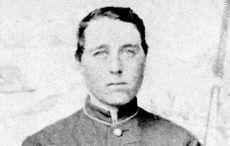As Teacher Appreciation Week draws to a close, Yvonne Watterson recalls the Northern Irish newsman who taught her so much.
Once upon a time, before news traveled at break-neck speed to our smart phones and our Cable TV networks, we waited for it. We had no choice, and when “the news” came on at teatime, it was a serious affair that demanded our attention. It was rarely, if ever, about a new animal born at the zoo or a wardrobe malfunction of someone famous. When Ulster Television (UTV) broadcaster, Brian Baird, entered our living rooms, in black and with poker-faced authority as he told us something new, we took it as gospel.
As my brother says, “You could read nothing in that face. It was all in the voice. The face, if it told you anything, told you this: listen to what I've found out since I was talking to you last. This is very important, and will take only three minutes.” There was no shuffling of papers, no fiddling with a pen - there was just the news.
I remember wondering, amid the flurry of texts and Tweets about the death of our poet, Seamus Heaney, how the late Brian Baird would have broken the news. Would he have maintained his composure or would he have lost what veteran American anchorman, Walter Kronkite once described as the “running battle between his emotions and his news sense” when he announced on-air, the assassination of President John F. Kennedy. I suspect the latter.
I first met Mr. Baird on a September morning in the early 1980s. I was a student at Queen’s University of Belfast’s Stranmillis College, and I was late for my first Modern Irish Fiction Since Joyce seminar. When I opened the door, it was to the sound of a familiar voice coming from the front of a classroom. There he was, sitting behind a desk that was too small for him, reciting Yeats, employing the gentle gravitas with which he also read the news. Away from the television screen in the corner of our living room on the Dublin Road, Mr. Baird was larger than life. As such, over the course of that year, he changed my life as only the best teacher can.
In Mr. Baird’s seminar, I discovered the novels of Edna O’Brien, the short stories of Frank O’Connor and Liam O’Flaherty, and Brian Friel’s plays. Even as I write, I can hear his recitation of Patrick Kavanagh’s “On Raglan Road,” which moved me to tears. Indeed, it is far preferable to think of Mr. Baird waxing poetic than reporting news that was mostly bad in those days.
It was he who introduced me to Seamus Heaney. “Professionally unfussed” like Heaney’s ‘Diviner.’ Mr. Baird led his students in and out of those poems, wondering always and wandering through rural places and practices I knew well, but had until then taken for granted. I felt a new pride, almost boastful, that I belonged to Heaney’s places - Castledawson, The Hillhead, The Lough shore, The Broagh. I found a new respect for the craft of certain men who peopled those parts and Heaney's poems – Barney Devlin, the blacksmith at “The Forge,” “The Thatcher,” and “The Diviner,” all men like my father who I once observed "witch" water, the pull of it so strong where he stood, that the stick in the shape of a wishbone, bent and almost tied itself in a knot, “suddenly broadcasting through a green hazel its secret stations.”
My new-found appreciation for the ways of life in the town lands of rural Derry did little to make me more punctual to class or timely with submission of homework. Mr. Baird referred to me as “the late Miss Watterson," announcing my arrival in a way that only encouraged my tardiness. I enjoyed the attention, and I saved every hand-written essay, because I loved his red-ink comments. I used to imagine him sharing these assessments of my writing on the six o’clock news: “A very sound survey, which I was pleased, at last, to receive. I had had oral evidence of its existence.” Or, “This was received very late, so I can’t guarantee this mark.” I got the mark anyway.
Mr. Baird began his professional journey as an English teacher in 1956, far away from Belfast, in Kuala Kangsa, a small town in Malaysia. He accepted a post that had recently been vacated by a John Wilson, who later, under the pen name of Anthony Burgess, wrote the 1962 novel "A Clockwork Orange." After a successful five years, he moved to the island of Penang, where his son, Patric, was born, and in 1963, the year I was born, Mr. Baird, his wife and young children were back in Belfast.
Some thirty years later, he would receive a letter from me. In anticipation of teaching an Irish literature class, I wondered if he would maybe share with me his syllabus. He obliged, and I love knowing that the elegant hand-written letter remains folded between the pages of the collected poems of Patrick Kavanagh.
I wish there had been more letters between us, because he probably had much more to teach me. He died in 1998, by which time I was consumed with learning how to be a new mother. I never made the time to thank him for the life-long gift of Seamus Heaney's poetry - there has not been one day of my adult life that I have not been grateful for it.
When Mr. Baird died, then manager of Ulster Television(UTV), Desmond Smyth, described him as many of us remember him:
To a TV generation, Brain Baird was the voice and the face of UTV news. He was a totally professional broadcaster and a charming work colleague with not an ounce of ego about him.
Like Seamus Heaney's men - not an ounce of ego.
One morning in April 2013, out of the blue, I received an email from his son, Patric. In his travels, he had found my writing and was pleased to read there about the impact of his father on yet another former student. It turns out I am part of a large and global fan-club. Patric told me that on a trip back to Malay to celebrate his fiftieth birthday, he met some of his father’s former pupils, now men in their seventies who recalled with gratitude how their teacher had helped shape their appreciation of literature and the English language.
It was a long struggle with a rare form of leukemia that killed my favorite teacher. Patric says he remained positive throughout the illness. Of course he did.
Sadly, Mr. Baird did not live to see his son become a journalist, nor would he ever know the full extent of his influence as a teacher and a lover of Seamus Heaney's poetry. And even though I know he is the man who kept on reading the news in spite of a fly landing on his lip, I have to believe that his inscrutable poker face would break into a smile at the thought of his son and a former student, each of us in our fifties and, like Heaney, “crediting marvels.”
After my husband died and the weekend before my first Christmas without him, a large envelope arrived from Belfast. Inside, was a typed letter from Patric, who had heard the news, and a familiar volume of poems. For some time, he had been meaning to send me one of his father's books of Heaney’s poetry, and while searching for my address, he learned of my husband's death. In his letter, he shared with some details of his father's death, a few days before Christmas in 1998, and told me of the long flight Patric made home to be with his family. Whether from London to Belfast or Phoenix to Arizona, the flight is too long, fraught with a desperate desire to just be where you belong.
So it was that Mr. Baird's personal copy of "Death of a Naturalist" became part of my collection. Patric tells me it was
"certainly the most dog-eared of the collection and probably the one he read the most. I'm sure he could think of no better person to whom he would like it passed on."
All over America this week, teachers and their craft were honored with public fanfare and the more personal gestures as well. It’s the time of year when some teachers are counting down the days until school’s out for summer, and others are figuring out how to make every minute matter until the final bell rings on the last day of school. Cards and hand-written letters of gratitude will be saved in shoe boxes and reopened over the years, lasting reminders of what Henry Adams said about a teacher’s effect on eternity. “He can never tell where his influence stops.”
Thank you, Mr. Baird. I am forever in your debt.




Comments